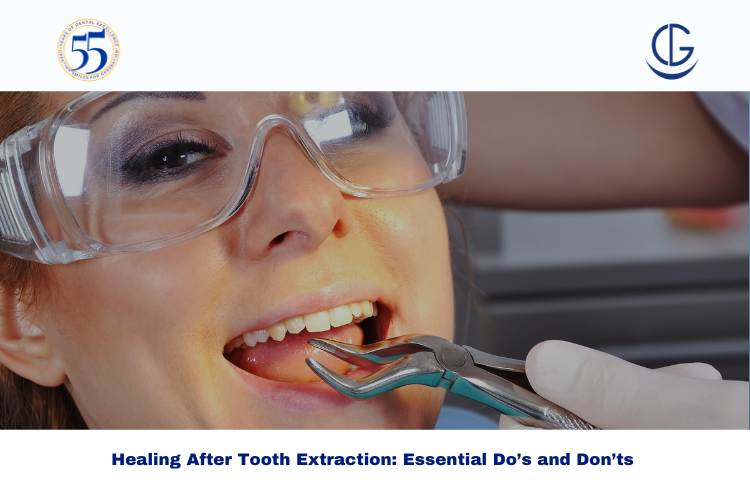Schedule Appointment



Tooth extraction is a common dental procedure, but the recovery process requires careful attention to ensure proper healing. At Dr Gowds Dental Hospital in Hyderabad, our team emphasizes the importance of following the right steps to support healing after tooth extraction. Whether you had a simple extraction or a surgical one, knowing how to care for your mouth post-procedure can significantly reduce pain and prevent complications.
In this guide, we’ll cover essential do’s and don’ts for tooth extraction healing, outline what to expect during tooth extraction recovery time, and provide tips for managing tooth extraction pain.
Healing after a tooth extraction involves the natural process of tissue repair and bone regeneration in the jaw. Typically, the initial healing stage lasts 1–2 weeks, while complete bone healing can take several months. Factors like oral hygiene, diet, and following your dentist’s instructions influence recovery.
Consulting a dental specialist in Hyderabad, can help monitor the healing process and address any concerns early.
Adhering to post-extraction instructions is crucial. Your dentist may provide a list of medications, rinsing schedules, or restrictions on activities. These instructions are tailored to your specific procedure and are key to tooth extraction healing.
Some bleeding is normal for the first 24 hours. Bite gently on a clean gauze pad to control it. If bleeding persists beyond a day or seems excessive, contact a dental hospital in Hyderabad immediately.
Keep the extraction site clean to prevent infection. Use a soft-bristled toothbrush and rinse gently with saltwater after meals. Avoid aggressive brushing near the wound. Proper hygiene speeds up tooth extraction recovery time.
Stick to soft foods like yogurt, mashed potatoes, and soups for the first few days. Avoid hard, crunchy, or sticky foods that can disturb the blood clot or irritate the extraction site.
A cold compress on the outside of your face can reduce swelling and numb discomfort. Use 15 minutes on and 15 minutes off during the first 24 hours.
Painkillers and antibiotics, if prescribed by your dental specialist in Hyderabad, can help manage tooth extraction pain and prevent infection.
Smoking and alcohol can slow healing and increase the risk of dry socket, a painful complication where the blood clot is dislodged.
Sucking through straws creates suction that can dislodge the clot and delay tooth extraction healing.
While gentle rinsing is encouraged, vigorous swishing can interfere with healing. Stick to light saltwater rinses.
Mild discomfort is normal, but if you experience intense tooth extraction pain, persistent bleeding, fever, or unusual swelling, contact Dr Gowds Dental Hospital immediately.
Heavy exercise or bending over may increase blood pressure and cause bleeding at the extraction site. Take it easy for a few days.
Recovery time varies depending on the complexity of the extraction:
Following the do’s and don’ts can reduce complications and support faster recovery.
Tooth extraction pain is common in the first 48 hours. Here’s how to manage it:
If pain worsens after the initial 48 hours, it may indicate an infection or dry socket, requiring immediate professional care.
While most patients heal uneventfully, contact a dental hospital in Hyderabad if you notice:
Professional monitoring ensures complications are addressed promptly, keeping your tooth extraction healing on track.
Healing after tooth extraction is a careful process that requires attention to oral hygiene, diet, and pain management. Following the right do’s and don’ts can accelerate recovery and reduce discomfort. Always consult a dental specialist for expert guidance, especially if unusual symptoms arise. Remember, the goal is safe, complete healing and a return to normal oral health.
Healing usually begins within a few days, with soft tissue recovery in 1–2 weeks. Complete bone healing may take several months. Following your dentist’s advice helps ensure proper recovery.
Take prescribed pain medication, apply cold compresses, and stick to soft foods. Avoid smoking, alcohol, and strenuous activity.
Yes, Dr Gowds Dental Hospital in Hyderabad offers comprehensive follow-ups to monitor tooth extraction healing and manage any complications.
Yes, avoid hard, crunchy, spicy, or sticky foods. Stick to soft foods like yogurt, mashed potatoes, and soups for the first few days.
Consult a specialist if you experience severe pain, persistent bleeding, fever, or swelling beyond a few days.